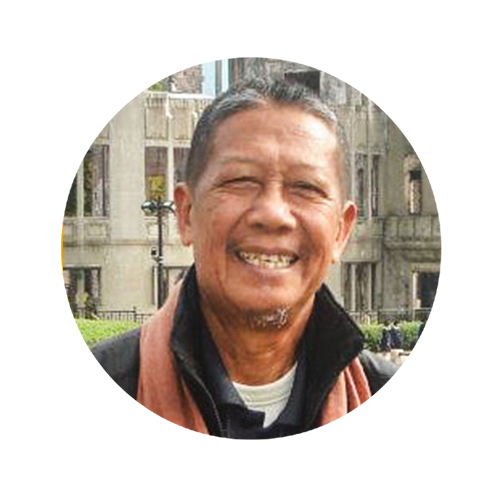A peace specialist even after he retired from Mindanao State University – Iligan Institute of Technology (MSU-IIT) as a Professor of the Department of History, Rudy Buhay Rudil, fondly called “Ompong,” remains a very passionate and active Mindanao historian and peace advocate. Ompong is the son of Tagalog migrants from Luzon who settled in Upi, Maguindanao, where he was born and grew up with the Tedurays and the Moro people. His experience and teaching stint in Sulu left a deep impression on him about the Moro and the Lumads. As a historian, the focus of his studies since 1971 is Mindanao-Sulu and its people. He first taught at Notre-Dame of Sulu and moved to Ateneo de Davao, then later joined Mindanao State University-Iligan Institute of Technology (MSU-IIT) for 23 years until he retired in 2007. He was also a Visiting Professor at Hiroshima University in 2011. Dr Cecille Tangian, Chair of MSU IIT’s Department of History, who was once Professor Ompong’s student and eventually a colleague, described him as the “noblest faculty member of the History Department because he made his students review and synthesize the 55 volumes of Grolier Encyclopedia in the vernacular which was difficult as it meant they had to go through the local historiography containing those of the global historiography.” He was also considered an “Eagle” who wanted everyone to fly with him in local historiography research and up to this day, even after his retirement, is regarded as MSU IIT’s Historian par excellence and the most generous, as he donated 3,900 books to the Department of History’s Library. In 1988, he was a commissioner of the Regional Consultative Commission in Muslim Mindanaw which helped Congress draft the Organic Act for the Autonomous Region in Muslim Mindanaw. As an acknowledged expert on the history of the Moro conflict, he was twice a member of the GRP peace negotiating panel in the talks with the Moro National Liberation Front (1993-1996) and vice chair of the Having started his studies on Mindanao, especially on the Moro and Lumad affairs, in the summer of 1973, Ompong has so far written five books, several monographs, and 150 articles mostly about Mindanao history, minoritization of the Moro and the Lumads, ancestral domain, and the peace processes both the formal and those on the ground. His advocacy can be summed up in three points: 1) the writing and mainstreaming of the Moro and Lumad history and correcting mental constructs that label them as pirates, savages, and uncivilized; 2) the healing and transformation of relationships among the peoples in Mindanao (Tri-people concept) and recognizing their right to self-determination in their ancestral domain; and 3) the use of the local language in the teaching of history. As a peace advocate, he has so far participated as a resource person in 795 forums, seminars, and conferences related to the creation of a culture of peace in Mindanao, both in the Philippines and abroad, but mostly in Mindanao where the problem is active. In 1996, he wrote for Kalinaw Mindanaw the Peace Credo, which carried a total of 18 languages of the Philippines with the same message: Journey to Peace and Harmony continues. He considers Fr Francisco Demetrio, SJ as one of his mentors as far as his readings are concerned. He emulated Fr Demetrio’s techniques in writing methodology and local historiography which greatly influenced his perspective about Mindanao, and with comparisons on Philippine and Southeast Asian settings. Now 80 years old, Ompong still wants to do more. “At this point, I feel there is an urgent need to produce a single book on Mindanao-Sulu History, not necessarily limited to one volume. We have experienced in many years, a history of mutual rejection, and the solution is to produce another history of mutual acceptance,” Ompong shared. Given the many tribes in the region and the impact of colonial impositions, he believes there is a need to give birth to a shared vision, shared values, and create new institutional arrangements which can only result from active dialogues at the community level, of people-to-people engagements with acceptance and respect for each other’s identity. Asked why he is still so passionate about his advocacy, he answered “this is for our children.” For as long as he still could, Ompong says he will continue to promote peace through his writings and the books he still intends to write, to create a new history for our children’s children. * * * * * * * In profound recognition of the inspiration he has shown in his lifelong work as a historian and advocate of peace among the indigenous peoples and the Moro community, Xavier University - Ateneo de Cagayan is pleased and deeply honored to confer to Prof Rudy Buhay Rodil, the Fr Francisco Demetrio Award (posthumous) of the 84th Commencement Exercises. |
